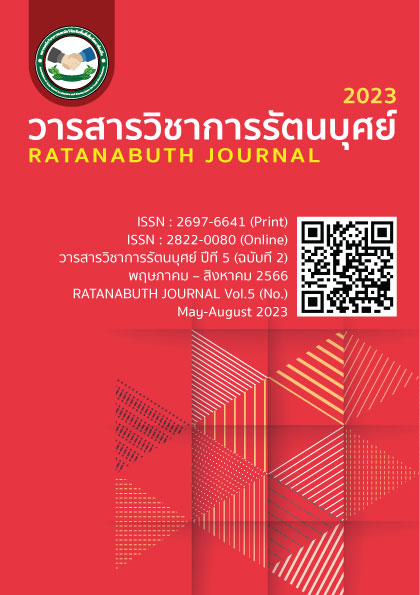Relationship Between Participation of Teachers and Effectiveness of Schools Under Loei Primary Education Service Area Office 1 Relationship Between Participation of Teachers and Effectiveness of Schools Under Loei Primary Education Service Area Office 1
Main Article Content
Abstract
Lack of efficiency in the administration of education is the centralization of power in the central too much. lack of participation the purposes of this research were to study 1) To study the level of teachers' participation in school administration. Under the Office of Loei Primary Education Service Area 1 2) to study the level of school effectiveness Under the Office of Loei Primary Education Service Area 1, 3) to study the relationship between teachers' participation in school administration and school effectiveness. Under the Office of Loei Primary Education Service Area 1. The sample were school administrators and teachers 306 people. The research tool was a 5-level scales questionnaire with a confidence value of .956. The instrument used in this study was questionnaires. The statistics used in the analysis are frequency, percentage, mean, standard deviation and Pearson’ simple correlation coefficient.
The results of the study revealed as follows:
- Teacher participation in school administration Under the Office of the Loei Primary Educational Service Area, Region 1, overall and each aspect had a high average level. by being able to rank the average from the highest to the lowest as follows: participation in the operation, followed by the participation in the benefits. Participation in decision-making and the aspect with the lowest mean was the aspect of participation in the evaluation, respectively.
- school effectiveness the educational institutes under the Office of Primary Educational Service Area, Loei District 1, overall and each side had overall averages at a high level. When considering each aspect, it was found that they were at a high level in all aspects. The aspect with the highest average was adaptation, followed by organizational mind. and the aspect with the lowest average was integration.
- Teacher participation in school administration and school effectiveness under the office of Loei Primary Educational Service Area 1 found that there was a positive relationship at a high level (r = .753) with statistical significance at the .01 level.
Article Details

This work is licensed under a Creative Commons Attribution-NonCommercial-NoDerivatives 4.0 International License.
References
กนกวรรณ บุราณสาร (2560).การบริหารแบบมีส่วนร่วมของผู้บริหารสถานศึกษาสังกัดสำนักงานเขตพื้นที่ การศึกษาประถมศึกษาชัยภูมิเขต 2.ปริญญาครุศาสตรมหาบัณฑิต ,สาขาการบริหารการศึกษา, คณะครุศาสตร์, มหาวิทยาลัยราชภัฎชัยภูมิ.
จุฑามาส พันสวรรค์. (2562). การพัฒนารูปแบบการมสี่วนร่วมของคณะกรรมการสถานศึกษา ในการ บริหารจัดการพัฒนาเด็กเล็กเทศบาลนครเชียงใหม่.หลักสูตรครุศาสตรมหาบัณฑิต สาขาวิชาการบริหารการศึกษา บัณฑิตวิทยาลัย มหาวิทยาลัยราชภัฏเชียงใหม่.
เฉลิมพล จันดา.(2560). การพัฒนาแนวทางการบริหรแบบมีส่วนร่วมโดยใช้ชุมชนเป็นฐานสำหรับสถานศึกษาขนาดเล็ก สังกัดสำนักงานเขตพื้นที่การศึกษายโสธร เขต 1.วารสารมหาจุฬานาครทรรศน์,7(6),229- 243.
ดวงเดือน วินิจฉัย.(2562). การพัฒนารูปแบบการบริหารแบบมีส่วนร่วมของโรงเรียนประถมศึกษาขนาดเล็ก สังกัดสำนักงานคณะกรรมการการศึกษาขั้นพื้นฐาน.สาขาวิชาการบริหาร การศึกษาคณะศึกษาศาสตร์,มหาวิทยาลัยบูรพา.
เดวิส และนวสตรอมิ.แนวคิด ทฤษฎี ตัวแบบ และแนวทางการศึกษาความสัมพันธ์ระหว่างประเทศ:การจัดกลุ่มทางความคิดและสาระสำคัญจากแนวคิดกระแสหลักช่วง คริสต์ศตวรรษที่ 201.วารสารรัฐศาสตร์และรัฐประศาสนศาสตร์,7(2),118 -151.
ธนภรณ์ พรรณราย.(2565). ปัจจัยที่ส่งผลต่อประสิทธิภาพในการปฏิบัติงานของบุคลากร องค์การบริหารส่วนจังหวัดสงขลา.ปริญญารัฐประศาสนศาสตรมหาบัณฑิต สาขาวิชารัฐประศาสนศาสตร์ มหาวิทยาลัยสงขลานครินทร.
ธัญญาลักษณ์ ใจเที่ยง.(2563). การมีส่วนร่วมของประชาชนในชุมชนเขตพระนครกรุงเทพมหานคร ต่อการพัฒนาทักษะเยาวชนไทย 4.0. ได้รับทุนสนับสนุนจากงบประมาณแผ่นดิน,ลิขสิทธิ์บัณฑิตพัฒนศิลป์
ยงค์ วิโรจน์เศษวงศ์ (2562).การบริหารแบบมีส่วนร่วมในการจัดการเรียนการสอนด้วยการศึกษาทางไกล ผ่านดาวเทียม สำหรับโรงเรียนขนาดเล็ก สังกัดสำนักงานเขตพื้นที่การศึกษาประถมศึกษาแม่ฮ่องสอน เขต 2. สาขาบริหารการศึกษา, บัณฑิตวิทยาลัยมหาวิทยาลัย ราชภัฎเชียงใหม่.
วิบูลอร นิลพิบูลย์. (2563). การบริหารแบบมีส่วนร่วมกับประสิทธิผลของโรงเรียน สังกัดสำนักงานเขตพื้นที่การศึกษาประถมศึกษานนทบุรีเขต 1.สาขาวิชาการบริหารการศึกษา แผน ก แบบ ก 2 ระดับ ปริญญามหาบัณฑิต ภาควิชาการบริหารการศึกษา บัณฑิตวิทยาลัย มหาวิทยาลัยศิลปากร.
สมบัติ เอกเชี่ยวชาญ (2560). บทบาทการบริหารแบบมีส่วนร่วมของผู้บริหารโรงเรียนคุณภาพของชุมชนในศูนย์พัฒนาคุณภาพการศึกษาบ้านเขว้า1สังกัดสำนักงานเขตพื้นที่ การศึกษาประถมศึกษาชัยภูมิเขต 1.หลักสูตรศึกษาศาสตร์มหาบัณฑิต สาขาการบริหารการศึกษามหาวิทยาลัยรามคำแหง
สุภัททา อินทรศักดิ์.(2561). การนำเสนอรูปแบบการบริหารแบบมีส่วนร่วมของโรงเรียนส่งเสริมสุขภาพ.งานนิพนธ์การศึกษา,สาขาการบริหารการศึกษามหาวิทยาลัยราชภัฏพระนครศรีอยุธยา
อภิรัตน์ ช่างเกวียน.(2564). บทบาทผู้บริหารกับประสิทธิผลของสถานศึกษา สังกัดสำนักงานเขตพื้นที่การศึกษามัธยมศึกษานครปฐม.สาขาวิชาการบริหารการศึกษา แผน ก แบบ ก 2 ระดับปริญญามหาบัณฑิต ภาควิชาการบริหารการศึกษา บัณฑิตวิทยาลัย มหาวิทยาลัยศิลปากร
อมรภัค ปิ่นกำลัง.(2562). การบริหารแบบมีส่วนร่วมของโรงเรียนเรียนรวม สังกัดสำนักงานเขตพื้นที่ การศึกษาประถมศึกษาสมุทรสงคราม. สาขาวิชาการบริหารการศึกษา แผน ก แบบ ก 2 ระดับปริญญามหาบัณฑิต ภาควิชาการบริหารการศึกษา บัณฑิตวิทยาลัย มหาวิทยาลัยศิลปากร
อำภา สมันพืช (2561). การมีส่วนร่วมในการบริหารกับความยึดมั่นผูกพันกับองค์การของครูในสถาบันการอาชีวศึกษากรุงเทพมหานคร. บัณฑิตวิทยาลัย : มหาวิทยาลัยสยาม
Bandura. (1977). A Social Learning Theory Englewood Cliffs. New Jersey: Prentice Hall.
Bert Nanus. (1992). Visionavy Leadership. San Francisco: Jossey-Bass Inc.
Brown, M. E., Treviño, L. K., & Harrison, D. (2005). Ethical Leadership: A Social Learning Perspective for Construct Development and Testing. Organizational Behavior and Human Decision Processes.
Gary Yukl (2010). Leadership in Organization. 7th ed. New Jersey: Prentice Hall.
Grace, B. (2006). Ethical Leadership: In Pursuit of the Common Good. Seattle, WA: Center For Ethical Leadership.
Henry, K. (2009). Leading with your soul: The comprehensive ethical leadership model™ shows you how to create an ethical workplace that will lead to sustainability for your company. In Proceedings of the ethics is a topic at IMA’s annual conference: Strategic Finance. (pp. 41-51). Chicago: North Park University.
Hoy, W. K. and Miskel, C. G. (1991). Educational Administration: Theory, Research, and Practice.4 th Edition. New York: McGraw-Hill.
Jaran Olsen & Dagfinn Aarhus Braseth. (2015). Morality, Meditation, and Wisdom: An Exploration of the Buddhist Foundation of Mindfulness-Based Stress Reduction. The University of Bergen
Kanokorn, S., Wallapha, A., & Ngang, T. K. (2013). Indicators of ethical leadership for school principals in Thailand. Procedia-Social and Behavioral Sciences.
Kohlberg, L. (1976). Moral Stages and Moralization: The Cognitive-Development Approach. In T. Lickona (Ed.), Moral Development and Behavior: Theory and Research and Social Issues (pp. 31-53). New York, NY: Holt, Rienhart, and Winston.
Mowbray, D. (2009). Code of conduct for ethical leadership a discussion document. Retrieved October 20, 2022 from www.derekmowbray.co.uk.
National Centre for Ethics in Health Care. (2005). Ethical Leadership Toolkit A manual for the Ethical Leadership Coordinator. Retrieved September 15, 2022, form http://www.ethics.va.gov/integratedethics/ELC.asp
Northouse, P.G. (2013). Leadership Theory and Practice. (6th ed.). California: SAGE Publications, Inc,
Sergiovanni, T. J. (1992). Moral leadership Getting to the heart of school. improvement. San Francisco: Jossey-Bass publisher.
Trevino, L.K., Hartman, L.P., and Brown, M. (2000). Moral Person and Moral Manager: How Executive Develop a Reputation for Ethical Leadership. California Management Review, 42(4).
Wong.P.T.P.; & Davey, M.A. (2007). Belt practice in servant leadership. Paperpresented at the servant leadership Roundtable at Regent University, Virginia Beach, VA, on July 2007. Retrieved October 19, 2022 from http:// www.regent.edu.


